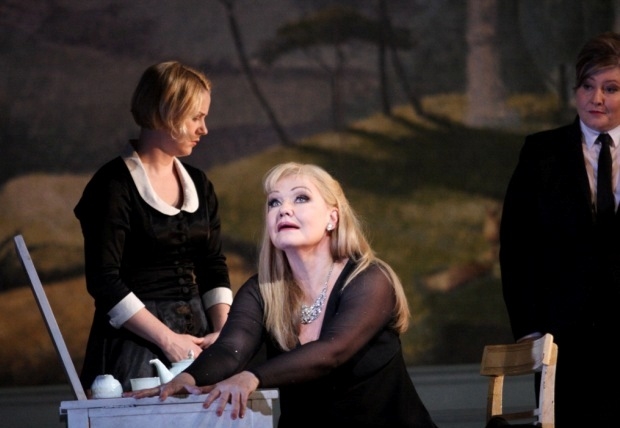Ariadne auf Naxos (Royal Opera House)

© Catherine Ashmore/Royal Opera House
Vagaries of programming mean there are just three chances to see Ariadne auf Naxos at Covent Garden this season, and if you were busy last night you've already missed one of them. Pummel the doors to get a ticket for Tuesday or Friday.
Christof Loy's staging of Strauss's rapturous oddity last played at the Royal Opera House only 15 months ago and the bulk of that cast has returned for this mini-revival. So how has the production leapt from excellence to euphoria in the interim? It can't be the substitution of Robert Dean Smith for Roberto Sacca as Bacchus in the climactic scene: each has the horsepower, neither is entirely perfect. And yes, the revival by Julia Burbach may be a model of its kind, but it was then too.
The answer lies in its star quality. Karita Mattila's Ariadne, the role for which she received a 2015 WhatsOnStage Opera Poll nomination, has gained in profundity – not just vocally but in the silent agony of her interiorised stillness for the hour when those around her madden her with madness.
Ariadne auf Naxos opens with an extended comic prologue set backstage (or, in Loy's production, below stairs) as rival troupes who represent the masks of tragedy and comedy prepare to give a private performance. The unsmiling ones are due to perform an intense new opera; the comedians, to the Composer's distaste, have been hired to wrap things up with a few laughs. When the event's wealthy patron demands, on a whim, that the two shows be fused into a single entity, feathers fly.
The resultant mishmash is played out in a witty clash of low and high art as commedia dell'arte meets an arthouse classic. Yet the genius of Strauss and his librettist, Hugo von Hofmannsthal, was to arrive at a sense of stylistic concord, a de facto statement that all artistic endeavour has its value.
'Show-stopping, jaw-dropping'
Contrary to received theatrical wisdom, Loy's 2002 production opens on a massive coup de théâtre and gets progressively simpler from there. The big prologue is frenetic; the ensuing opera dares to be intimate and at times even static. Luxury casting abounds as Thomas Allen returns as the harassed Music Master, Nikolay Borchev impresses as a priapic Harlequin and Karen Cargill's Exocet mezzo brings her brilliantly sung Dryad to the fore.
Another mezzo, Ruxandra Donose, is dynamic as the hapless Composer. The high-lying passages may challenge her (like so many of Strauss's female roles it was intended for a soprano) but she sings her concentrated set pieces with idiomatic gusto and acts with practised ease as the proud creative artist who's beset by (understandable) mood swings.
Jane Archibald has performed the flirtatious coloratura clown Zerbinetta far and wide, and her assurance in the character's big solo scena is now breathtaking. Show-stopping, jaw-dropping, the casual precision of Archibald's stratospheric brilliance has to be heard to be believed.
All of these seemingly disparate parts are wrought into a seamless whole by the conducting of Lothar Koenigs in a distinguished Royal Opera debut. How sensitively he gauges the balance of Strauss's orchestrations! They're unusually light in this opera, but he supports the voices subtly: airy for Zerbinetta, full-blooded under Mattila's dramatic soprano and Smith's Heldentenor in the expansive, neo-Wagnerian finale.
Five-star shows are hard to define – they're not necessarily about perfection – but you know when you've seen one. This is a shoo-in.
There are further performances of Ariadne auf Naxos on 13 and 16 October.










